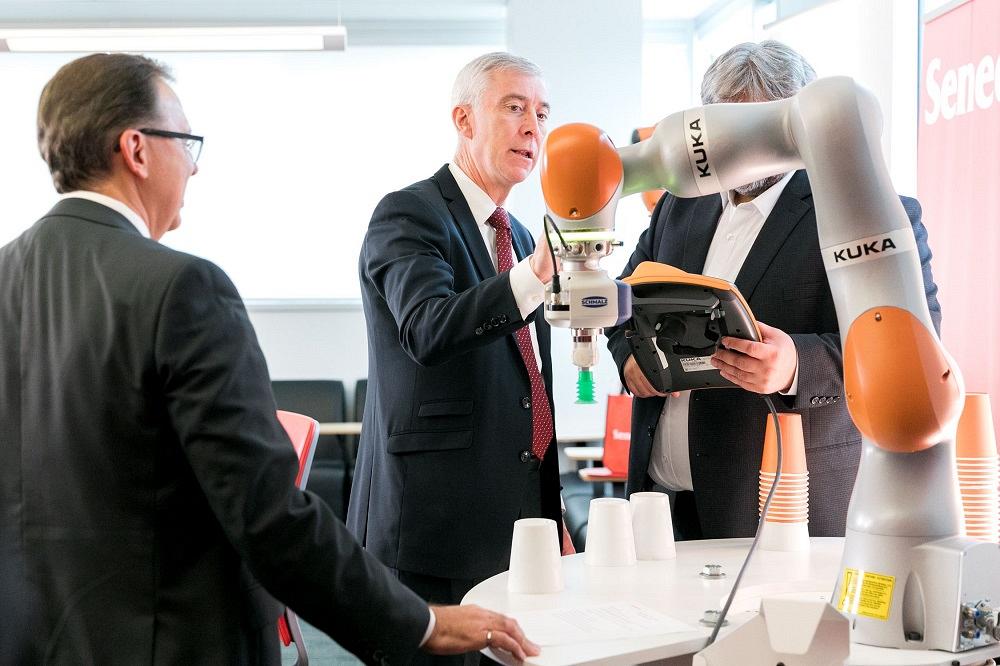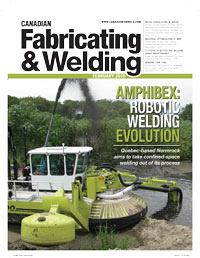Editor
- FMA
- The Fabricator
- FABTECH
- Canadian Metalworking
Seneca, KUKA partner to create robotics opportunities at Toronto campus
- By Rob Colman
- January 31, 2019
- Article
- Automation and Software
Seneca College and advanced manufacturing and robotics company KUKA Canada Ltd. (KUKA) have signed a memorandum of understanding (MOU) to provide Seneca students with state-of-the-art robotic equipment and the opportunity to enhance their advanced manufacturing skills.
KUKA and Seneca will jointly develop strategic initiatives focused on technology innovation and work closely on skills development through curriculum that supports the Industry 4.0 concept, and robotic automation. This partnership will include a modern KUKA robotics lab within Seneca’s new Centre for Innovation, Technology and Entrepreneurship (CITE) at its Newnham Campus, which opened in January 2019.
“At Seneca we are continuously supporting the needs of industry by creating real-world industry training environments. This includes bringing in current real-world expertise, for both our students and faculty members,” said Ranjan Bhattacharya, dean of the Faculty of Applied Science and Engineering Technology. “This relationship with KUKA creates such an opportunity.”
Bhattacharya came onboard at Seneca three and a half years ago.
“Industry 4.0 continues to be a significant opportunity for Seneca, in terms of conceptualizing how we can work with the advanced manufacturing sector here in Ontario to ensure a competitive advantage for our manufacturing industry,” he said. “As a post-secondary institution, we need to address manufacturers’ need for graduates with a clear understanding of how to incorporate automation and digital resources skills to improve their value to potential employers. Strong industry partnerships allows us to do just that.”
Bhattacharya noted how Industry 4.0 has broken down many of the silos that once existed in education. Where once electronics, computer engineering, and mechanical manufacturing engineering technology were distinct disciplines, those divisions no longer make sense.
“We developed a strategy based on this understanding,” he explained. “For instance, students are now prepared to achieve the internationally recognized Siemens mechatronics certification through Seneca. Like our partnership with KUKA, that connection with Siemens has created the sort of outcomes-based approach to learning that is at the heart of what Seneca aims to provide.”
KUKA will participate in the development of Seneca’s robotics and automation curriculum. This may include providing guest lecturers and technical workshops and offering opportunities for Seneca students to train and gain practical knowledge and experience with KUKA’s portfolio of technologies.
“This new technology and technological know-how will be applied directly to a new credential, the electromechanical engineering technology advanced diploma,” said Bhattacharya.
CITE will house all of Seneca’s mechanical programs, some of which were previously located at a different campus.
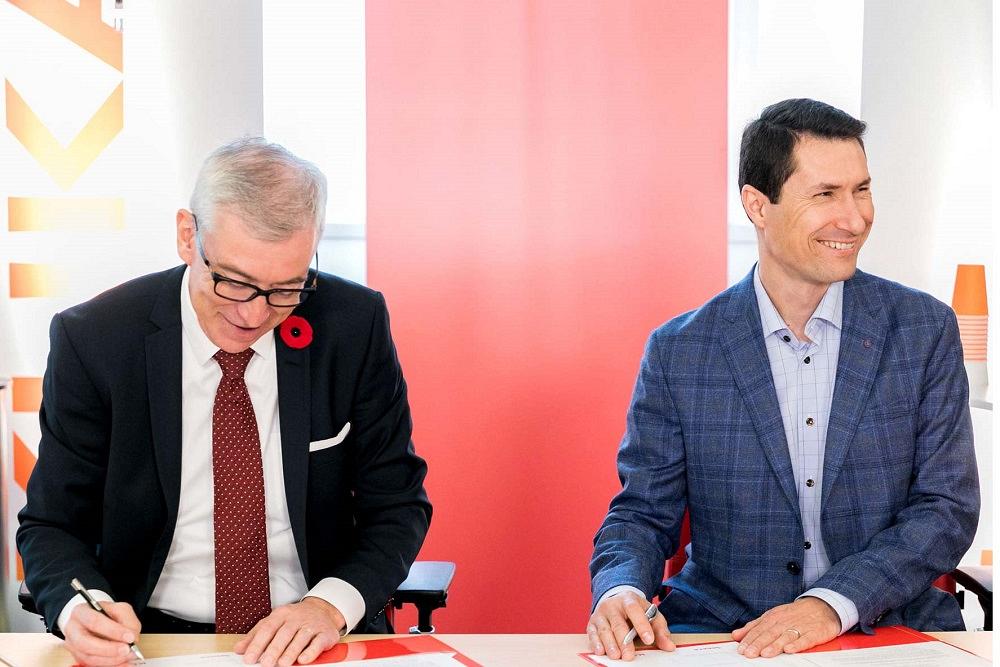
David Agnew (l), Seneca president and Steve Green, general manager – Robotics & Solutions, KUKA Robotics (USA) signing the MOU.
“We made the decision to move them to our main campus so we could have a more cross-disciplinary collaborative effort,” Bhattacharya said.
“At the end of the discussions, KUKA took our vision and added to it. They see the value of working with post-secondary institutions. The value of the partnership between the two partners is significant. The KUKA Robotics Lab will be opened spring or summer of this year.”
The 1,200-square-foot lab will initially include seven robots alongside associated software.
“This technology evolves rapidly, so the current complement of robots could be added to or interchanged for new technology as necessary,” said Bhattacharya. “This is one of the exciting parts of this relationship: the ability to refresh the lab as industry trends emerge and needs change. We want to be a centre where industry comes to look at new technology and work with us. I call it the hub model, where we become a destination in the GTA for this type of training.”
KUKA is also keen to see the success of Seneca’s lab come to fruition.
“Last year when we went down this path of strengthening partnerships with institutions, Seneca was one of a few colleges we began working with,” said Katia Papadimatos, marketing and corporate image manager, KUKA Robotics Canada. Papadimatos considers the Seneca MOU to be unique. “Seneca created opportunities for growth for both parties. When we thought about how we’d work with them, we wanted to be an active collaborator, to help develop required infrastructure for advanced manufacturing and Industry 4.0, so we’ll be involved in updating student curriculum aimed at addressing automation and Industry 4.0 concepts. Seneca has got some key faculty who are just incredible to deal with and with whom we’re constantly collaborating. This is a strategic investment in the success of the students and the companies they will eventually work for.”
Papadimatos discussed the many trends that will be impacted by robotics in the near future that will be key for graduates using this technology.
“We’re seeing more and more SMEs adopting robotic automation to improve their competitiveness in terms of quality, cost, and delivery times,” she said. “These range from robotic welding systems to machine tending systems and material handling. But some of the biggest shifts we’re looking at in future are mobility products, such as the need to move materials from assembly to processing to shipping. Automated workflow management is one of the biggest trends we’re seeing. Connected to all of this are collaborative robot applications, predictive maintenance, and other Industry 4.0 offshoots. All of this will grow together and change manufacturing substantially, and rapidly.”
The partnership also has the potential to evolve into establishing internships and/or co-op opportunities.
In addition, Seneca faculty members will have the opportunity to undergo training to become KUKA-qualified instructors.
About the Author

Rob Colman
1154 Warden Avenue
Toronto, M1R 0A1 Canada
905-235-0471
Robert Colman has worked as a writer and editor for more than 25 years, covering the needs of a variety of trades. He has been dedicated to the metalworking industry for the past 13 years, serving as editor for Metalworking Production & Purchasing (MP&P) and, since January 2016, the editor of Canadian Fabricating & Welding. He graduated with a B.A. degree from McGill University and a Master’s degree from UBC.
subscribe now


Keep up to date with the latest news, events, and technology for all things metal from our pair of monthly magazines written specifically for Canadian manufacturers!
Start Your Free Subscription- Trending Articles
Aluminum MIG welding wire upgraded with a proprietary and patented surface treatment technology

Achieving success with mechanized plasma cutting
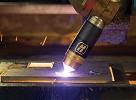
Hypertherm Associates partners with Rapyuta Robotics

Gema welcomes controller

Brushless copper tubing cutter adjusts to ODs up to 2-1/8 in.
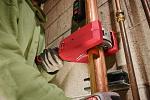
- Industry Events
MME Winnipeg
- April 30, 2024
- Winnipeg, ON Canada
CTMA Economic Uncertainty: Helping You Navigate Windsor Seminar
- April 30, 2024
- Windsor, ON Canada
CTMA Economic Uncertainty: Helping You Navigate Kitchener Seminar
- May 2, 2024
- Kitchener, ON Canada
Automate 2024
- May 6 - 9, 2024
- Chicago, IL
ANCA Open House
- May 7 - 8, 2024
- Wixom, MI













